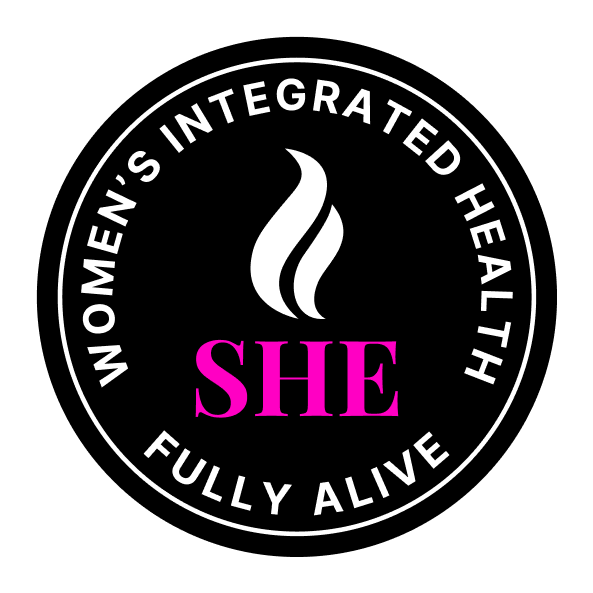
Physical Health

The Physical Health Pillar at SHE. FULLY ALIVE centers on the vitality and optimal functioning of the body. It encompasses regular movement, balanced nutrition, restorative sleep, and proactive wellness practices such as screenings, vaccinations, and preventative care.
Strong physical health is reflected in the energy, strength, and stamina needed to meet life’s demands. It also involves the ability to prevent or manage chronic conditions, recover from illness or injury, and support the body’s systems for long-term well-being.
At SHE. FULLY ALIVE, we believe that caring for the body is an act of reverence—one that allows us to show up fully, with resilience, confidence, and presence.
At SHE. FULLY ALIVE, the Physical Health Pillar promotes a balanced and intentional approach to caring for the body—one that cultivates sustainable habits over time. This includes regular movement, nourishing food and hydration, restorative sleep, and maintaining strength and mobility, especially as we transition into our 50s and beyond.
For women in midlife, these habits are not only vital—they are protective. Establishing them earlier in life lays the foundation for lasting well-being and graceful aging.
The Mayo Clinic, a recognized leader in women’s health, offers expert guidance on topics such as nutrition, sleep, menopause, and more. (Mayo Press, 2025)

Our Relationship with Food
The Mediterranean Diet—or MedDiet—originates from the traditional eating patterns of people living near the Mediterranean Sea, particularly in Greece, southern Italy, and other parts of southern Europe. More than just a diet, it represents a holistic approach to nourishment and well-being.
Core characteristics of the MedDiet include:
-
Daily consumption of whole, unprocessed foods such as fruits, vegetables, whole grains (e.g., whole grain bread, pasta, brown rice), legumes, nuts, and low-fat dairy
-
Olive oil as the primary source of healthy fats
-
Moderate intake of fish, poultry, potatoes, eggs, and sweets
-
Limited red meat, typically consumed monthly
-
Optional, moderate alcohol consumption, particularly red wine with meals
-
Regular physical activity as part of daily life
This way of eating has been linked to reduced risk of chronic disease and enhanced longevity. According to the Mayo Clinic (2025), the MedDiet supports both physical health and a mindful relationship with food, encouraging enjoyment, balance, and intentionality.
Furthermore, research indicates that nutrition plays a critical role in influencing cellular and molecular processes associated with cancer. In fact, a healthy lifestyle—including dietary choices—can prevent an estimated 30–50% of cancers (NIH, 2022).
The Mediterranean Diet aligns well with these preventative strategies due to its emphasis on antioxidant- and anti-inflammatory-rich foods. Key components of the MedDiet—such as legumes, fruits, nuts, vegetables, fish, and olive oil—are rich in bioactive nutrients. These compounds are known to support cellular health by reducing oxidative stress, modulating inflammation, and inhibiting cancer cell proliferation, thereby offering protective effects against cancer development.

The Role of Sleep
Sleep is not a luxury—it is a biological necessity. It plays a vital role in every system of the body, influencing our physical health, mental clarity, emotional resilience, appearance, energy levels, and our ability to engage meaningfully in work and relationships (Mayo Clinic, 2025).
Yet in today’s hustle culture, prioritizing rest is often misunderstood as laziness or a lack of ambition. Nothing could be further from the truth. Science clearly shows that chronic sleep deprivation disrupts the body’s stress response system, elevates cortisol levels, and diminishes our capacity to regulate emotions and recover from daily challenges (Morteza, 2025).
At SHE. FULLY ALIVE., we affirm sleep as a cornerstone of physical health—one of the most powerful and accessible tools we have for living with clarity, vitality, and balance.

Hormonal Changes and
Sleep Disruption
Certain life stages—especially menopause—can significantly impact sleep quality for women. Research by Haddadi et al. (2025) found that women experience a decline in sleep quality during menopause, regardless of whether the transition occurs naturally or surgically. This decline is often linked to hormonal fluctuations that affect the body's ability to regulate temperature, stress, and mood—factors that are closely tied to restful sleep.
Given these challenges, it’s important to consult a healthcare provider who specializes in menopause-related care. Expert guidance can help women navigate this transition and identify strategies or treatments that support long-term health, energy, and overall well-being.

